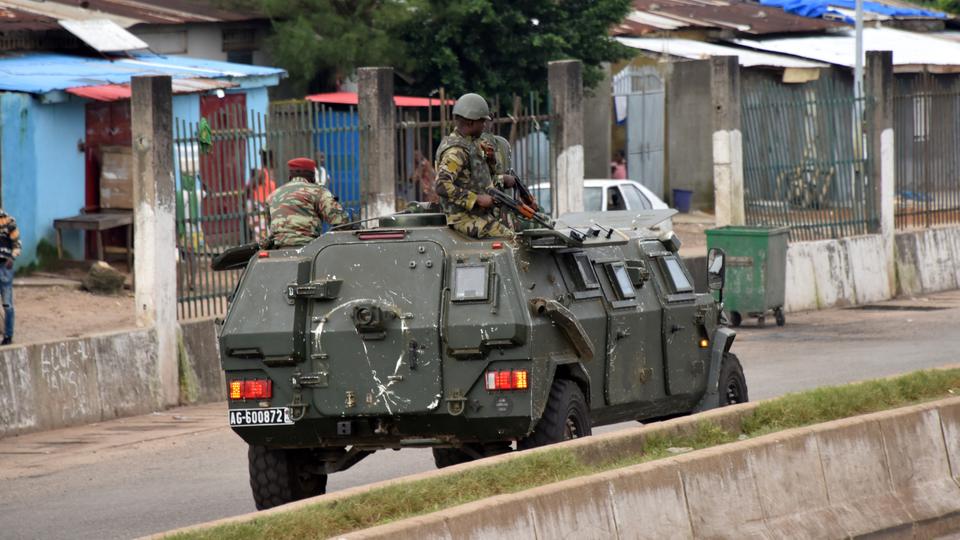The army's statement came hours after heavy gunfire broke out near the presidential palace in the capital Conakry, with several sources saying an elite national army unit led by a former French legionnaire, Mamady Doumbouya, was behind the unrest.

Guinean special forces have staged a coup, arresting the president, in the latest political upheaval to roil the impoverished west African country.
"We have decided, after having taken the president, to dissolve the constitution," said a uniformed officer flanked by soldiers toting assault rifles in a video sent to AFP.
The officer also said that Guinea's land and air borders have been shut and the government has been dissolved.
Another video sent to AFP by the putschists showed a rumpled-looking President Alpha Conde sitting on a sofa, surrounded by troops. He refused to answer a question from one soldier about whether he was being mistreated.
Guinea – one of the world's poorest countries despite boasting significant mineral resources – has long been beset by political instability.
Earlier on Sunday, residents of the capital Conakry's Kaloum district, the government quarter, reported hearing heavy gunfire.
A Western diplomat in Conakry who declined to be named suggested the unrest may have started after the dismissal of a senior commander in the special forces – provoking some of its highly trained members to rebel.
AFP was unable to independently confirm this account.
Later on, the head of Guinea's military special forces, Lieutenant-Colonel Mamady Doumbouya, appeared on public television, draped in the national flag, and cited government "mismanagement" as a reason behind his actions.
"We are no longer going to entrust politics to one man, we are going to entrust politics to the people," the coup leader said.
"Guinea is beautiful. We don't need to rape Guinea anymore, we just need to make love to her," Doumbouya added.
Apparently there's a coup taking place in guinea 🇬🇳 https://t.co/E1iS12Fbm9
— Fiona Ursula (@Ms_F1971) September 5, 2021
UN chief condemns 'takeover'
UN Secretary General Antonio Guterres condemned the apparent coup in Guinea and urged putschists to release the country's detained president.
"I am personally following the situation in Guinea very closely. I strongly condemn any takeover of the government by force of the gun and call for the immediate release of President Alpha Conde," Guterres tweeted.
The putsch comes amid a long period of political tension in Guinea, first spurred by Conde's highly contested bid for a third presidential term last year.
The day before the presidential election last year, the military blocked access to Kaloum after an alleged military rebellion east of the capital.
Conde, 83, also survived an assassination attempt in 2011.
'Proud of the special forces'
There was initial confusion about Sunday's events, as the government released a statement saying that it had "repulsed" a special forces attack on the presidential palace.
But the reality of the putschists' success set in as the day wore on.
The coup plotters announced a so-called national committee for assembly and development, which will be tasked with consulting political and civil society figures on the way forward.
They said the constitution would be rewritten.
Doumbouya also told French media "we are holding all of Conakry," and that he had the support of all the defence and security forces.
News of the coup sparked celebrations in some parts of the capital, where hundreds of people applauded the soldiers.
"We are proud of the special forces," said one demonstrator who requested anonymity. "Death to the torturers and to the murderers of our youth".
Violent elections
The most recent presidential poll in the nation of some 13 million people, in October 2020, was violently disputed and also marred by accusations of electoral fraud.
Conde won a controversial third term in that poll, but only after pushing through a new constitution in March 2020 that allowed him to sidestep the country's two-term limit.
Dozens of people were killed during demonstrations against a third term for the president, often in clashes with security forces. Hundreds were also arrested.
Conde was then proclaimed president on November 7 last year – despite his main challenger Cellou Dalein Diallo as well as other opposition figures calling the election a sham.
After the poll, the government launched a crackdown and arrested several prominent opposition members for their alleged role in abetting electoral violence in the country.
Conde, a former opposition leader himself who was at one point imprisoned and sentenced to death, became Guinea's first democratically elected leader in 2010 and won re-election in 2015.
Hopes of a new political dawn in the former French colony have withered, however, and he has been accused of drifting into authoritarianism.
Social media is bold.
Social media is young.
Social media raises questions.
Social media is not satisfied with an answer.
Social media looks at the big picture.
Social media is interested in every detail.
social media is curious.
Social media is free.
Social media is irreplaceable.
But never irrelevant.
Social media is you.
(With input from news agency language)
If you like this story, share it with a friend!
We are a non-profit organization. Help us financially to keep our journalism free from government and corporate pressure













0 Comments